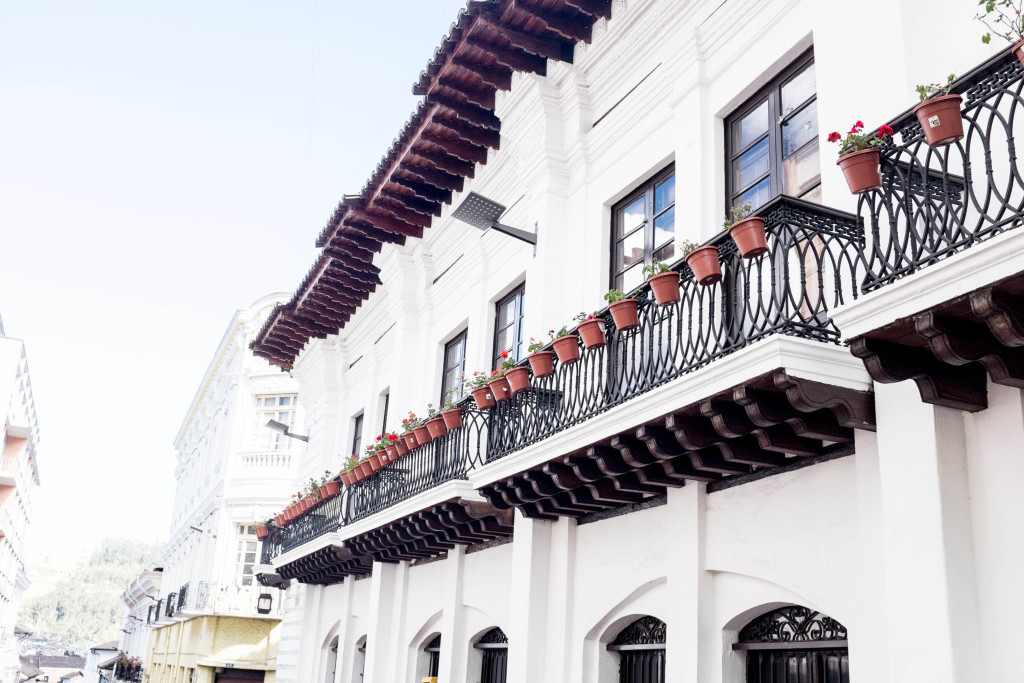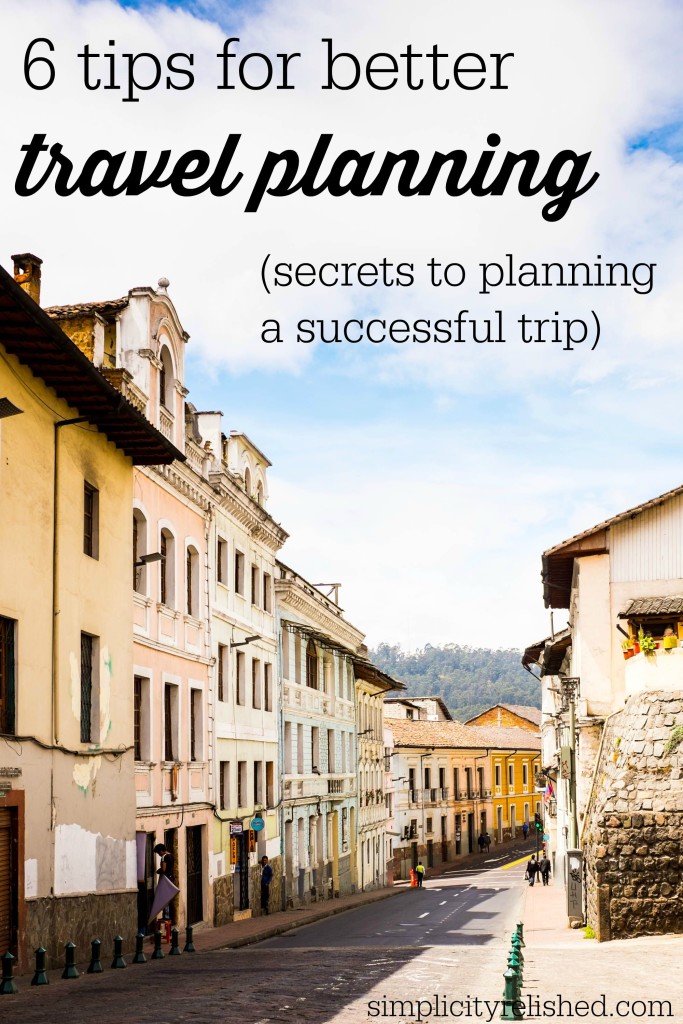There’s often something stressful about international (or even domestic) travel. It’s odd that a leisure activity can be so anxiety-inducing, but most of us will work up a bit of a sweat before we step on the plane. We’re usually running through a mental checklist of items, hoping that there’s nothing vital that has been left behind.
How a trip turns out is often a matter of perspective; but we can do our best to plan ahead. So how do we go from conception to execution in a streamlined, thorough, and possibly even enjoyable manner?
There are some obvious steps towards good trip planning, which I won’t elaborate on:
- Start planning early, especially for flights and accommodations.
- Set a budget and research the estimated costs of all aspects of the trip.
- Choose a destination that is financially, mentally, and physically appropriate.
In addition to these steps, however, there are a few tricks I use to make sure the trips I plan go as smoothly as possible. Here they are!
6 Tips For Better Travel Planning
1) Do the macro (big picture) research first.
How much do you really know about the destination you’ve selected? Start with very general searches: use Google and Pinterest to turn up basic names and images from the place you’re visiting.
I usually create a Pinterest board to collect images for places I’m planning to visit. This helps me remember the sights that I want to see when I’m there, and orients me towards the most popular places in that area. For example, I created a board for our travels to southern Spain this winter:
Follow Daisy @ Simplicity Relished’s board TRAVEL // Spain on Pinterest.
Make note of what stands out to you: religious buildings, historical landmarks, stunning views, trademark experiences, etc. While letting these images set your expectations might not be a good idea, make sure you know what all the highlights are before digging deeper.
Create a list of sights and experiences you would like to research further.
2) Do the micro (in-depth) research.
Good travel research requires some digging around. Here are some ways that I do that:
- Purchase the travel guide– yes, a book. Having a book always makes me more comfortable; despite finding lots of information on the Internet, I find that guide books still have the most information compiled in one place.
- Look up tour company itineraries to your destination. I like to make note of which sights the itineraries visit, and in what order. I also take note of any hotels or restaurants that look intriguing.
- Reach out to friends (or bloggers) who have been there. You don’t have to do what someone else did, but getting their opinion can be valuable. I find that other people are often the easiest source when it comes to figuring out logistics– transportation, dining, accommodations, and more.
- Start reading TripAdvisor reviews for your sights of choice. I’m cautious with reviews because different travelers have different tastes. However, once I’ve decided to visit a certain sight, I make sure to read about others’ experiences so that I can go in with eyes wide open.
3) Determine the level of activity and outline a schedule.
Some people enjoy planning their travels down to the hour, while others prefer to go with the flow. I think a good balance of both is important: make sure to schedule time for anything you absolutely want to see, and leave room for flexibility should you need to rest or slow down.
For those destinations that require tickets, appointments, or tours, it’s important to book those before you arrive, if possible. Last-minute bookings can often lead to few choices, or less-than-quality experiences.
We usually like to have only a few scheduled sights per day– and then play it by ear the rest of the time. I love indulging our time at a new destination; exploring without a strict schedule makes me happy.
4) Prepare yourself for changes in climate and culture.
Beyond researching what you want to see, it’s important to also research what you should expect. Many tourists forget that travel means entering into a climate and culture that somebody else calls home. This can mean being prepared for exhaustion, trying new foods, dressing differently, and being mindful of our words and behavior.
It is absolutely imperative to learn about the local climate and culture before you arrive. Is the altitude high? Is the culture conservative? What is considered rude and what is polite?
If you’re looking for a specific country, you can try searching Wandershare Travel Cheat Sheets on Pinterest. It will give you very basic information, and you can go from there.
5) Leave room for error and create a backup plan.
This is again an issue of preference, but I think it is unwise to expect a trip to go 100% as planned. Things happen– sometimes completely outside our control– and it can devastate any strict itinerary.
Here are some ways to circumvent disaster if something unexpected occurs:
- Do not schedule anything important right before or right after a flight, bus ride, or train ride.
- Avoid depending on a single person you don’t know very well to follow through on something big.
- Know how to ask for help in places where you might need it: the train station, the bank, the hotel lobby, or the cab.
- Find out what you can do if the weather is less than ideal.
- Leave plenty of time to get from one place to another; having too much free time is better than not having enough.
6) Organize and compile all information from the start.
From the very beginning, organize all of your correspondences, searches, and files in a manner that works for you. Whether this means using labels on email, bookmarking websites, or writing everything down in a notebook, keeping the information together is key to smooth planning.
As soon as you have made reservations, be sure to write down confirmation numbers as well as the payment method you used. Bring this information with you when you travel.
I like to print out all of the information and place it in a folder, instead of expecting my phone to give me all the answers. Electronics are generally reliable, but you never know when it might malfunction, be stolen, or simply out of batteries.
It’s all about being thorough.
Sure, some of us are happier to “wing it” than others. But if you’re reading this post, I assume you’re interested in at least some level of planning. Most of us travel to these destinations without the expectation that we will get to come back– so of course it’s important to make sure we get what we can out of them!
In the end, it does not really matter where you’re going or what your budget is: planning is necessary to get the most out of your travels. And once you’re there, the best thing to do is to make the most of your adventure.
[Tweet “How to plan your BEST travels ever– no matter what destination or budget via @daisylinshih #travel”]




Most of the people are now like to use google maps and this is so easy to use. There are most of the users are satisfies about this service and i think for find out the new place this is best technology for us.
Glad you enjoyed this, Kate! I’m so impressed with how lightly you’re packing for your next trip!
I use Pinterest a good deal to collect information. I think the thing that is most difficult to plan for at this point is what I’m going to pack because of the weather. I’ll be gone for nearly 2 weeks and only taking a small messenger bag style purse and a 40L backpack. Thanks for posting this!
Oh nice!! Google maps is a great resource too, even just so we can orient ourselves as to where everything is.
I use Pinterest too!! I created a board on California when I traveled back in March. I also use Google maps where I pin point everything I need. If I know that I won’t have wifi access I print the map out!
Thanks friend!! And yes TripAdvisor is helpful once we narrow down where we’re headed and which specific spots we’re interested in! I do take people’s reviews with a grain of salt though 😉
Thank you Laura! And I agree about the Internet– some articles are helpful while others seem to under-deliver. Guide books are great; I’m thinking about getting one for the south of Spain!
LOVE these tips, Daisy! Together, these really help to set you up for realistic expectations and the best possible use of travel time. TripAdvisor reviews are my favorite way to scope out hotels, sights, experiences, etc.
This is a great post Daisy! Really helpful! Totally agree about travel guide books. The downside with Internet research is sometimes it’s just luck or you have to know what you are looking for. Whereas it’s all there in a guide book. I also love those travel sheets on Pinterest too!
Laura
http://www.agirlandherhome.com
Yeah!! Those sheets are all over Pinterest– and they’re a good overview before digging deeper. And I will definitely reach out to you with more questions! We’re so excited!
Yes the planning process can be so much fun! Such great anticipation.
Oh yes! NYT and Conde Nast can be really helpful. I need to look into Design Sponge guides too!
Yes, relying on locals and/or people who’ve visited before is definitely the way to go. Your trip to Cambodia was so great! And especially with public transport, things can go wrong! My mom and I got in trouble on the bus in France because we didn’t know what to do with our tickets– needless to say, it slowed our plans!
Oooh I’ve never heard of the Wandershare Travel Cheat Sheets! Very cool! And yay for planning your trip to Spain! 🙂 I loved all of these tips! Let me know if you need anything else related to your trip to Spain! Would love to help out!
Great tips! I love travel + planning (even though sometimes it can be a bit stressful)!
Great tips Daisy! I like the New York Times 48 hours guides and Design Sponge has a great collection of travel guides for international travel planning.
Now that we’re traveling outside the USA so much more, I definitely ask people who’ve been there before for travel advice or tips or ideas. It’s so much easier not going in blind. And, when we went to Cambodia, I was incredibly glad that we were traveling with my Dad, who’s been to Cambodia many times and knew exactly what to do–our destinations are usually big cities, and when there isn’t a metro or bus system to figure out, I’m lost.
Also, knowing ahead of times that things will go wrong, and planning to handle those things with grace, is a good thing. We went into our trip to Hawaii last year knowing that it was our very first time relying on the public bus to take us everywhere–Angel said at the beginning, “We’re going to get on the wrong bus…or miss our stop…sometime. So, when it happens, let’s just decide not to be sad about it.” And yep, we did miss our stop, but it just a little extra adventure…
Thank you Ashley! Yes– high-end tour companies are usually willing to share their itineraries, and it is really helpful to figure out what they think is a must-see!
I love your tips, but especially the one to look up how tour companies order the sights! What great insight to have when you are planning your own “tour.” Excited to use these tips for our next major vacation!
Thanks Ash!! And haha, my husband’s pretty helpful with planning too– he reminds me about what we like and don’t like in practice. Sometimes I’m too idealistic!
Ahh I am SO excited for your trip!! 🙂 I think the right amount of planning can be helpful so you don’t spend precious time there figuring it out!
Yes yes yes!! So glad you use Pinterest too– it’s really quite helpful.
Yup! Flexibility is really important, and slow travel can be great. I just prefer to show up with some knowledge of what I want to see, so I completely agree with you!
Yes absolutely Macy! I try not to rely on my phone too much when traveling– I also hate waving a smart phone around!
Yup. I completely agree! x
Yes! Researching can help us save time and hit all the points we want to. Thank you for stopping by, Kay!
Thanks for reading! Yes, not all destinations are for everyone!
I’m the worst at planning travel. I usually end up really stressed out because I want to do too many things, so I make my husband do the planning, haha! I’m definitely bookmarking this for later!
I horrible at the planning process of a trip. I’m much more, just go with it, which causes way more anxiety than necessary. We are heading to Hawaii next week and I’ve been trying to do a bit more planning ahead with this one because I just want to enjoy it!
Shannon
Clothes & Quotes
I’ve never traveled internationally, but we do our fair share of traveling the East coast. Ironically Pinterest has been the biggest time saver. I like pinning Restaurants, activities, attractions, then one click and I’m at their website. (:
http://www.accordingtokiki.net
So helpful to have a concise list! I agree with Kristyn below, that being “too planned” can take away from the experience a bit, but too planned is way better than under planned!
These tips are wonderful! I also am a big fan of travel books, I like to have something in my hand and easy to access when I can’t get to my phone while abroad.
These are great tips. The only thing I don’t really love when I travel is to be too planned. Does that make sense? I don’t want it planned down to the minute of what we should be doing…I like some things to naturally happen. But I do think that you need to schedule tours and things like that in advance and have a plan of what to tackle each day.
Great tips! I love travel and its so important to research before !
Great post! I agree in that it’s very important to pick a destination you can mentally handle otherwise you’ll end up uncomfortable and not having a good time!